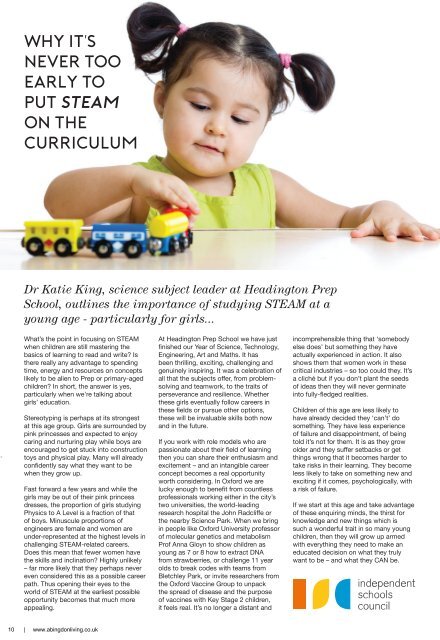Abingdon Living Mar - Apr 2020
Spring has awakened and our magazine is alive with a bountiful bouquet of features - from interviews with famous faces, delicious Easter recipes, travel to Santa Barbara, UK staycations, a bathroom and tile guide plus advice on choosing the right school.
Spring has awakened and our magazine is alive with a bountiful bouquet of features - from interviews with famous faces, delicious Easter recipes, travel to Santa Barbara, UK staycations, a bathroom and tile guide plus advice on choosing the right school.
You also want an ePaper? Increase the reach of your titles
YUMPU automatically turns print PDFs into web optimized ePapers that Google loves.
Why it's<br />
never too<br />
early to<br />
put STEAM<br />
on the<br />
curriculum<br />
Dr Katie King, science subject leader at Headington Prep<br />
School, outlines the importance of studying STEAM at a<br />
young age - particularly for girls...<br />
What’s the point in focusing on STEAM<br />
when children are still mastering the<br />
basics of learning to read and write? Is<br />
there really any advantage to spending<br />
time, energy and resources on concepts<br />
likely to be alien to Prep or primary-aged<br />
children? In short, the answer is yes,<br />
particularly when we’re talking about<br />
girls’ education.<br />
Stereotyping is perhaps at its strongest<br />
at this age group. Girls are surrounded by<br />
pink princesses and expected to enjoy<br />
caring and nurturing play while boys are<br />
encouraged to get stuck into construction<br />
toys and physical play. Many will already<br />
confidently say what they want to be<br />
when they grow up.<br />
Fast forward a few years and while the<br />
girls may be out of their pink princess<br />
dresses, the proportion of girls studying<br />
Physics to A Level is a fraction of that<br />
of boys. Minuscule proportions of<br />
engineers are female and women are<br />
under-represented at the highest levels in<br />
challenging STEAM-related careers.<br />
Does this mean that fewer women have<br />
the skills and inclination? Highly unlikely<br />
– far more likely that they perhaps never<br />
even considered this as a possible career<br />
path. Thus opening their eyes to the<br />
world of STEAM at the earliest possible<br />
opportunity becomes that much more<br />
appealing.<br />
At Headington Prep School we have just<br />
finished our Year of Science, Technology,<br />
Engineering, Art and Maths. It has<br />
been thrilling, exciting, challenging and<br />
genuinely inspiring. It was a celebration of<br />
all that the subjects offer, from problemsolving<br />
and teamwork, to the traits of<br />
perseverance and resilience. Whether<br />
these girls eventually follow careers in<br />
these fields or pursue other options,<br />
these will be invaluable skills both now<br />
and in the future.<br />
If you work with role models who are<br />
passionate about their field of learning<br />
then you can share their enthusiasm and<br />
excitement – and an intangible career<br />
concept becomes a real opportunity<br />
worth considering. In Oxford we are<br />
lucky enough to benefit from countless<br />
professionals working either in the city’s<br />
two universities, the world-leading<br />
research hospital the John Radcliffe or<br />
the nearby Science Park. When we bring<br />
in people like Oxford University professor<br />
of molecular genetics and metabolism<br />
Prof Anna Gloyn to show children as<br />
young as 7 or 8 how to extract DNA<br />
from strawberries, or challenge 11 year<br />
olds to break codes with teams from<br />
Bletchley Park, or invite researchers from<br />
the Oxford Vaccine Group to unpack<br />
the spread of disease and the purpose<br />
of vaccines with Key Stage 2 children,<br />
it feels real. It’s no longer a distant and<br />
incomprehensible thing that ‘somebody<br />
else does’ but something they have<br />
actually experienced in action. It also<br />
shows them that women work in these<br />
critical industries – so too could they. It’s<br />
a cliché but if you don’t plant the seeds<br />
of ideas then they will never germinate<br />
into fully-fledged realities.<br />
Children of this age are less likely to<br />
have already decided they ‘can’t’ do<br />
something. They have less experience<br />
of failure and disappointment, of being<br />
told it’s not for them. It is as they grow<br />
older and they suffer setbacks or get<br />
things wrong that it becomes harder to<br />
take risks in their learning. They become<br />
less likely to take on something new and<br />
exciting if it comes, psychologically, with<br />
a risk of failure.<br />
If we start at this age and take advantage<br />
of these enquiring minds, the thirst for<br />
knowledge and new things which is<br />
such a wonderful trait in so many young<br />
children, then they will grow up armed<br />
with everything they need to make an<br />
educated decision on what they truly<br />
want to be – and what they CAN be.<br />
10 | www.abingdonliving.co.uk


















